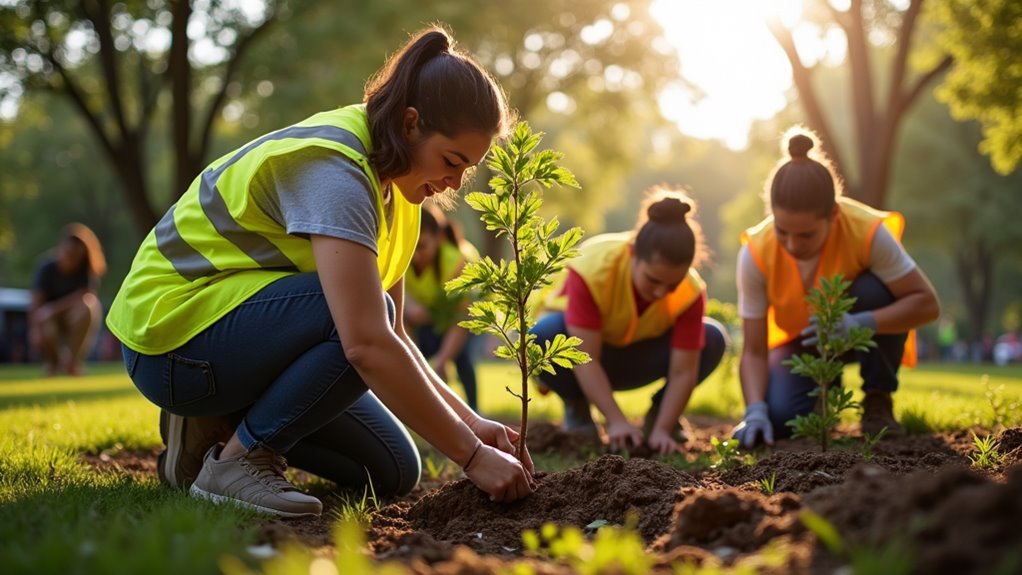Let's explore how everyday activities can transform our personal growth journey. We've all heard about self-improvement strategies, but many of us struggle to implement them in meaningful ways. What's often overlooked is that real transformation doesn't require elaborate programs or expensive coaching – it starts with simple, actionable steps we can take right now. From morning routines that set our day's intention to practical ways we can disconnect from digital distractions, there's a world of accessible opportunities waiting to reshape how we approach our development.
Occassionally I might feature some affiliate links in my articles. If you make a purchase through these links, I may earn a small commission at no extra cost to you. Thanks for supporting me.
Morning Reflection and Journaling
Morning reflection and journaling consistently provide a powerful foundation for personal growth and daily success. Through mindful journaling, we can tap into our thoughts and emotions right as we wake up, setting a clear direction for the day ahead.
By starting with simple prompts like "What do I need today?" we create space for intentional living and self-discovery. Setting daily goals helps enhance mental clarity and focus for the tasks ahead.
Let's make the most of our reflective mornings by establishing a dedicated journaling spot and committing to write immediately after waking. We don't need to write extensively; even a single sentence can spark meaningful insights.
When we focus on gratitude and daily intentions, we train our minds to recognize opportunities and maintain a positive outlook throughout the day.
The key to effective morning journaling lies in consistency and genuine reflection. We'll benefit most when we treat this practice as a crucial part of our morning routine, using it to process our thoughts, fears, and aspirations.
Mindful Goal Setting

Success in personal development requires a mindful approach to goal setting that aligns our actions with our deepest values and aspirations. Through goal alignment, we can break down our larger ambitions into smaller, manageable steps that feel less overwhelming and more achievable. This process helps us maintain focus while building momentum through regular wins.
Progress tracking becomes essential as we implement mindful goal setting. We'll want to use journals or logs to document both our actions (inputs) and results (outputs), helping us stay aware of our development journey. Practicing gratitude through regular journaling enhances our appreciation of progress made.
By monitoring our progress regularly, we can make necessary adjustments and celebrate small victories along the way.
Let's focus on creating sustainable change by setting specific goals across different life areas. We'll identify our compelling reasons for each goal, ensuring they truly resonate with our values.
Instead of fixating solely on outcomes, we'll emphasize the daily processes that lead to lasting transformation. This approach reduces emotional attachment to specific results while fostering a deeper understanding of our personal growth journey.
Community Service Projects

Over the years, community service projects have emerged as powerful catalysts for personal growth and social impact. When we participate in volunteer opportunities, we develop essential leadership skills by organizing events, coordinating teams, and solving real-world problems collaboratively. Working in direct service roles like tutoring or assisting at senior centers allows us to make immediate positive impacts in people's lives.
Through community engagement, we're exposed to diverse perspectives and cultures, helping us broaden our worldview and develop deeper empathy for others. We learn to understand community needs firsthand while working alongside people from various backgrounds, fostering meaningful connections that can last a lifetime.
What's particularly valuable about community service projects is how they complement our academic and professional development. We're able to apply classroom knowledge in practical settings, gaining hands-on experience that's relevant to future careers.
These activities help us build networks and references while developing vital skills that employers value.
Beyond the tangible benefits, we find opportunities for profound personal growth. As we work with others toward shared goals, we develop stronger communication skills, enhance our problem-solving abilities, and discover new aspects of ourselves.
The sense of purpose and accomplishment we gain creates lasting positive impacts on our overall well-being.
Active Skill Development

Active skill development represents the cornerstone of personal growth, requiring deliberate practice and structured learning approaches. We can achieve skill mastery through consistent, focused effort and well-designed practice schedules that align with our daily routines.
Continuous learning opportunities can be maximized through reading educational materials and taking courses to expand knowledge.
Let's break down complex skills into manageable components and track our progress using digital tools and habit-tracking apps.
To maximize our learning potential, we'll want to implement SMART goals and create detailed learning plans. These plans should include specific milestones, regular self-assessment periods, and opportunities for feedback from peers or mentors.
We can enhance our development by incorporating mind-mapping techniques to visualize our progress and identify areas needing improvement.
Regular journaling and cognitive restructuring exercises help us maintain awareness of our growth journey while addressing any mental blocks or limiting beliefs. When we combine these practices with physical activities and creative exercises, we create a holistic approach to skill development.
Digital Detox Practices

While mastering new skills demands focused attention, our constant connection to digital devices often undermines our growth potential. By implementing a strategic digital detox, we can reclaim our time and mental space for meaningful personal development.
Let's start by establishing digital boundaries through screen-free zones in our homes, particularly in bedrooms and dining areas. We'll benefit from improved sleep quality and more meaningful face-to-face interactions. Physical health often improves through reduced eye strain when we limit our screen exposure.
Using tracking apps to monitor our screen time helps us understand our digital habits and set realistic reduction goals, such as cutting back by two hours daily.
To make our digital detox sustainable, we should gradually reduce our device usage while replacing screen time with enriching activities.
We can explore mindfulness meditation, rediscover old hobbies, or engage in outdoor activities.
It's crucial to communicate our intentions to friends and family, ensuring they understand and support our commitment to reduced digital consumption.
Building Meaningful Connections

The journey of building meaningful connections begins with a foundation of authenticity and intention. We can strengthen our relationships through empathy exercises that help us understand others' perspectives and emotions. By practicing active listening and showing genuine interest in others' stories, we create spaces where trust can flourish. Small gestures of help can create lasting bonds between neighbors and friends.
Vulnerability practices play a vital role in deepening our connections. When we share our authentic experiences and emotions, we invite others to do the same. This mutual openness creates bonds that go beyond surface-level interactions.
Let's remember that meaningful relationships develop gradually, requiring patience and consistent nurturing.
We can enhance our connections by finding common interests and engaging in meaningful conversations. Simple acts of kindness, like remembering important details about others or offering support during challenging times, demonstrate our commitment to the relationship.
It's vital to maintain a balance of giving and receiving while being fully present in our interactions. By focusing on these fundamental aspects of relationship-building, we create lasting connections that enrich our lives and contribute to our personal growth.
Frequently Asked Questions
How Can I Maintain Personal Development Habits When Traveling Frequently?
We'll maintain growth by establishing travel routines that work anywhere. Let's leverage mobile learning apps, schedule habits into daily plans, and adapt our development practices to different environments.
What Role Does Genetics Play in Personal Growth and Development Potential?
Like a blueprint guides construction, genetic influence shapes our potential, but we're not bound by hereditary traits. We can overcome limitations through dedication, learning, and purposeful environmental choices.
Can Personal Development Activities Negatively Impact Existing Relationships?
We can experience shifts in social dynamics when pursuing growth, leading to emotional detachment in relationships, especially if our partners aren't growing alongside us or feel threatened by our changes.
How Much Money Should I Budget Monthly for Personal Development Activities?
Like planting seeds for growth, we recommend budgeting 5-10% of monthly income for personal development. Financial planning strategies suggest adjusting this based on your income and existing financial commitments.
At What Age Is It Too Late to Start Personal Development?
We're never too late to begin our personal development journey. Life changes and midlife awakenings can happen at any age, creating perfect opportunities for growth and transformation throughout our entire lives.
Conclusion
Just like tending a garden, we can cultivate our personal growth through these daily activities. We've explored the transformative power of morning reflections, mindful goals, community service, skill development, digital detox, and meaningful connections. By integrating these practices into our routines, we're not just improving ourselves – we're creating ripples of positive change that extend far beyond our individual journeys. Let's take that first step today.

